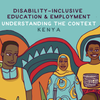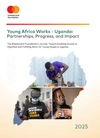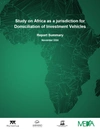Key Findings
- Kenyan policies on disability inclusion in education and employment are strong, but implementation gaps hamper progress.
- Promising initiatives include soft skills and IT training, work placements, and the introduction of Augmentative and Alternative Communication in some schools.
- There is also a need for monitoring systems and accountability mechanisms for disability-related policies.
- Specific challenges in education include limited funding for tuition and assistive technologies and underfunding of Educational Assessment and Resource Centres.
- Challenges in employment include failure to meet disability employment quotas in government and financial constraints in agricultural activities.
- Disability disaggregated data on education and employment indicators are needed
About the Series
Recognizing that meaningful inclusion for young people with disabilities starts with listening and learning, the Mastercard Foundation developed a research program to map the policy landscape and to hear directly from young people with disabilities.
This research was carried out in partnership with the International Centre for Evidence in Disability at the London School of Hygiene & Tropical Medicine (LSHTM), the University of Abuja, the University of Ghana, Lifetime Consulting Ltd, Addis Ababa University, University of Nairobi, Global Advocacy and Research Group and MRC/UVRI & LSHTM Uganda Research Group.
Two report series have been developed, covering the Mastercard Foundation’s seven countries of focus – the first on the context, the second elevating youth voices.
Briefs summarizing the key findings of each report have been prepared by Dr. Xanthe Hunt in collaboration with LSHTM and the Mastercard Foundation’s research team.




